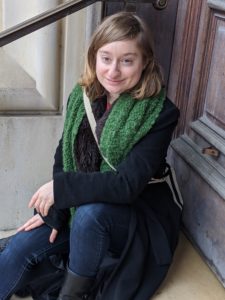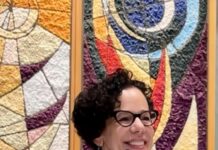
Like most, Rachel Franklin, 25, is looking forward to businesses and attractions opening back up.
Unlike most, part of why she wants them to open is so she can finally get to really explore Baltimore, after having moved here in February of 2020.
Franklin grew up in Overland Park, Kan., a suburb of Kansas City, Mo. She attended Rockhurst University in Kansas City, where she studied economics and took health care and graduate-level business courses.
Franklin moved to Baltimore from Washington, D.C., where she lived for about three years. She works for the Center for Medicare and Medicaid Services and lives in Mount Vernon with her boyfriend.
You moved here pretty shortly before the pandemic. How’s that been going?
It’s been both good and bad. I’m very glad to be in Baltimore and to have the chances to get take-out from a bunch of different new places and wander around and explore, but I definitely feel a little bit unmoored. I feel like I don’t actually know what it’s like to live in Baltimore. Everyone tells me about all the street festivals and all these cool neighborhoods, and it’s just not accessible right now, so I feel like I’m always waiting for everything to open up again.
What was the Jewish community in Kansas City like?
The Jewish community in Kansas City was really nice, fairly tight knit. There were not many synagogues that I hadn’t been to. It was really nice to grow up doing Israeli folk dancing, going to tons of festivals and events no matter the denomination. You probably know about the shooting that happened at our Jewish Community Center. That happened while I was in college. That made a big difference to me to be there physically when that happened, to be able to go to memorial services and take care of forming a [human chain] when the Westboro Baptist Church tried to picket it. That didn’t show me the strength and resilience of the Jewish community of Kansas City — I already knew that — but it made a huge difference for me to have people calling from all over the country and being able to say, “No, I’m OK, we’re all OK. We’re not going to let this change things.”
What interested you in health care?
I was really fascinated with the health care system because I spent my teenagerhood lost in it. I got mysteriously sick when I was about 14, and I had an extreme amount of pain in my stomach with no other explanation or other symptoms. I bounced around a lot from hospital to hospital, from doctor’s office to doctor’s office, because I just couldn’t get a diagnosis and then couldn’t get treatment because of that.
Eventually, I did end up getting a diagnosis and getting treatment and I’ve been well ever since, but that really defined a lot of my interest because when you’re not sick, you don’t think about health care. You don’t worry about, does health care work, is it OK. You go to the doctor every year and it’s fine when you’re a kid. Spending all this time in hospitals, I talked to a lot of kids who were my age who had serious medical conditions and who had been dealing with the health care system. I talked to a lot of parents, because I was at a lot of children’s hospitals, who weren’t able to get care because of financial reasons or weren’t able to get the referrals that they needed.
When I became really fascinated with economics, with this way of looking at and analyzing systems, I immediately wanted to know how does that apply to health care, and finding out more and more about that just had me more and more passionate about that field.






